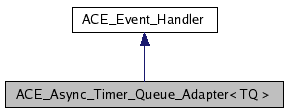ACE_Async_Timer_Queue_Adapter< TQ > Class Template Reference
Adapts an ACE timer queue to be driven asynchronously using signals. More...
#include <Timer_Queue_Adapters.h>


Public Types | |
| typedef TQ | TIMER_QUEUE |
Public Member Functions | |
| ACE_Async_Timer_Queue_Adapter (ACE_Sig_Set *mask=0) | |
| Constructor. | |
| long | schedule (ACE_Event_Handler *type, const void *act, const ACE_Time_Value &future_time, const ACE_Time_Value &interval=ACE_Time_Value::zero) |
| int | cancel (long timer_id, const void **act=0) |
| int | expire (void) |
| TQ & | timer_queue (void) |
| Return a reference to the underlying timer queue. | |
Private Member Functions | |
| virtual int | schedule_ualarm (void) |
| Perform the logic to compute the new ualarm(2) setting. | |
| virtual int | handle_signal (int signum, siginfo_t *, ucontext_t *) |
Called back by SIGALRM handler. | |
Private Attributes | |
| ACE_Sig_Handler | sig_handler_ |
| TQ | timer_queue_ |
| ACE_Sig_Set | mask_ |
Mask of signals to be blocked when we're servicing SIGALRM. | |
Detailed Description
template<class TQ>
class ACE_Async_Timer_Queue_Adapter< TQ >
Adapts an ACE timer queue to be driven asynchronously using signals.
This implementation uses the ACE_OS::ualarm call, to generate the SIGARLM signal that is caught by this class.
- Note:
- This adapter only works on platforms that support ualarm(). POSIX platforms generally do; Windows and some others do not.
- Todo:
- This adapter does not automatically reschedule repeating timers.
Member Typedef Documentation
| typedef TQ ACE_Async_Timer_Queue_Adapter< TQ >::TIMER_QUEUE |
Constructor & Destructor Documentation
| ACE_Async_Timer_Queue_Adapter< TQ >::ACE_Async_Timer_Queue_Adapter | ( | ACE_Sig_Set * | mask = 0 |
) | [inline] |
Constructor.
Register the SIGALRM handler. If mask == 0 then block all signals when SIGALRM is run. Otherwise, just block the signals indicated in mask.
Member Function Documentation
| int ACE_Async_Timer_Queue_Adapter< TQ >::cancel | ( | long | timer_id, | |
| const void ** | act = 0 | |||
| ) | [inline] |
Cancel the timer_id and pass back the act if an address is passed in.
| int ACE_Async_Timer_Queue_Adapter< TQ >::expire | ( | void | ) | [inline] |
Dispatch all timers with expiry time at or before the current time. Returns the number of timers expired.
| int ACE_Async_Timer_Queue_Adapter< TQ >::handle_signal | ( | int | signum, | |
| siginfo_t * | , | |||
| ucontext_t * | ||||
| ) | [inline, private, virtual] |
| long ACE_Async_Timer_Queue_Adapter< TQ >::schedule | ( | ACE_Event_Handler * | type, | |
| const void * | act, | |||
| const ACE_Time_Value & | future_time, | |||
| const ACE_Time_Value & | interval = ACE_Time_Value::zero | |||
| ) | [inline] |
Schedule the timer according to the semantics of the ACE_Timer_List. This timer gets dispatched via a signal, rather than by a user calling expire(). Note that interval timers are not implemented yet.
| int ACE_Async_Timer_Queue_Adapter< TQ >::schedule_ualarm | ( | void | ) | [inline, private, virtual] |
Perform the logic to compute the new ualarm(2) setting.
| TQ & ACE_Async_Timer_Queue_Adapter< TQ >::timer_queue | ( | void | ) | [inline] |
Return a reference to the underlying timer queue.
Member Data Documentation
ACE_Sig_Set ACE_Async_Timer_Queue_Adapter< TQ >::mask_ [private] |
Mask of signals to be blocked when we're servicing SIGALRM.
ACE_Sig_Handler ACE_Async_Timer_Queue_Adapter< TQ >::sig_handler_ [private] |
Handler for the SIGALRM signal, so that we can access our state without requiring any global variables.
TQ ACE_Async_Timer_Queue_Adapter< TQ >::timer_queue_ [private] |
Implementation of the timer queue (e.g., ACE_Timer_List, ACE_Timer_Heap, etc.).
The documentation for this class was generated from the following files:
 1.5.8
1.5.8